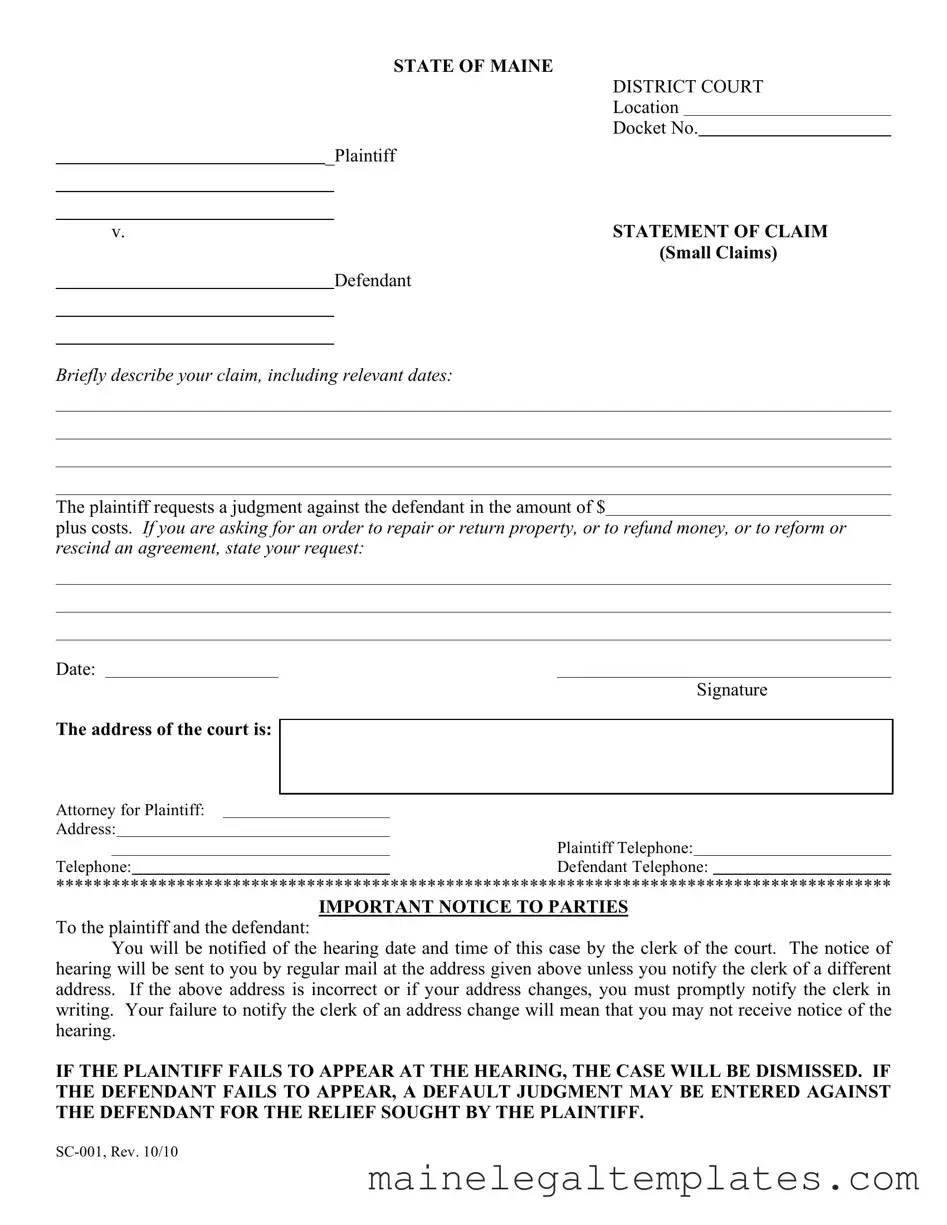Get Maine Sc 001 Form in PDF
The Maine SC 001 form is a crucial document used in small claims court to initiate a legal action between a plaintiff and a defendant. It serves as the Statement of Claim, outlining the nature of the dispute and the relief sought by the plaintiff. This form requires the plaintiff to detail their claim, including relevant dates and the specific amount of money being requested, along with any associated costs. If the plaintiff seeks an order for the repair or return of property, a refund, or any changes to an agreement, they must clearly articulate their request on the form. The form also includes essential information such as the court's address, contact details for both parties, and the signature of the plaintiff. An important aspect of the SC 001 is the notice to parties, which informs both the plaintiff and the defendant about the hearing date and the necessity of keeping the court updated on any address changes. Failure to appear at the hearing can have significant consequences, such as dismissal of the case or a default judgment against the defendant. Understanding the components and requirements of the Maine SC 001 form is vital for anyone involved in a small claims dispute.
Dos and Don'ts
When filling out the Maine SC 001 form, it's essential to follow specific guidelines to ensure accuracy and compliance. Here’s a helpful list of what you should and shouldn’t do:
- Do provide a clear and concise description of your claim, including relevant dates.
- Do specify the amount you are requesting, including any costs.
- Do include your current address and contact information for both parties.
- Do promptly notify the clerk of any address changes to avoid missing important notices.
- Do ensure that you sign the form before submission.
- Don't leave any sections of the form blank; incomplete forms may be rejected.
- Don't provide false information; this can lead to legal consequences.
- Don't forget to check the court's address for accuracy.
- Don't ignore the notice of hearing; failure to appear can result in dismissal or default judgment.
Following these guidelines will help streamline the process and ensure that your claim is properly considered by the court.
Key takeaways
When filling out the Maine SC 001 form, keep these key takeaways in mind:
- Clear Description: Provide a concise description of your claim, including any relevant dates. This helps the court understand your case.
- Amount Requested: Specify the amount you are seeking from the defendant, along with any costs associated with your claim.
- Property Requests: If your claim involves property issues, clearly state whether you are asking for repairs, returns, refunds, or changes to an agreement.
- Correct Court Address: Ensure that you have the correct address of the court listed on the form to avoid any communication issues.
- Notification of Hearing: The court clerk will notify both parties of the hearing date and time via regular mail. Make sure your address is accurate.
- Address Changes: If your address changes, promptly inform the court clerk in writing to ensure you receive all necessary notifications.
- Attendance is Crucial: If the plaintiff does not appear at the hearing, the case will be dismissed. Conversely, if the defendant fails to show up, a default judgment may be issued.
- Service of Statement: Confirm that you have served the Statement of Claim to the defendant properly, either in person or by leaving it with someone at their residence.
Following these guidelines will help ensure that your claim is processed smoothly and efficiently.
Instructions on Filling in Maine Sc 001
Filling out the Maine SC 001 form is a straightforward process that allows you to present your claim in a small claims court. After completing the form, you'll submit it to the appropriate court, and then you will be informed of the hearing date and time. It's important to ensure all information is accurate to avoid any delays in your case.
- Obtain the form: You can find the Maine SC 001 form online or at your local district court.
- Fill in the court location: Write the name of the district court where you are filing the claim.
- Enter the docket number: If you have a docket number, include it in the designated space. If not, leave it blank.
- Identify the parties: Fill in the names of the plaintiff (you) and the defendant (the person you are claiming against).
- Describe your claim: In the provided space, briefly explain your claim, including any relevant dates. Be clear and concise.
- Specify the amount: Indicate the amount you are requesting in damages, plus any costs associated with your claim.
- State your request: If applicable, describe any specific orders you are requesting, such as repairs, returns, or refunds.
- Date the form: Write the date you are filling out the form.
- Provide court address: Include the address of the court where the claim is being filed.
- Enter attorney information: If you have an attorney, include their name, address, and telephone number. If you are representing yourself, leave this section blank.
- Sign the form: As the plaintiff, sign the form in the designated area. Include your telephone number for contact purposes.
- Fill in defendant's information: Include the defendant's telephone number for reference.
- Complete service details: If applicable, fill out the section regarding how you served the Statement of Claim to the defendant, including the date and method of service.
- List service costs: If you incurred any costs for service, such as travel or postage, list those amounts in the appropriate sections.
Find Popular Forms
Form Bsf186 - Individual applications for instructors can be submitted for a fee.
Maine Rew 5 - Each seller involved in a property sale must submit a separate REW 5 form unless they are married filing jointly.
When purchasing or selling a boat in New York, it is crucial to have a well-documented transaction, highlighted in the New York Boat Bill of Sale. This document not only acts as a receipt for the sale but also contains vital information about the buyer and seller, along with specifics of the boat. For those looking for guidance in creating this important legal document, consider visiting Templates and Guide to find templates that can assist you in ensuring all necessary details are included for a seamless transfer of ownership.
Maine Vehicle Title - The inspector must note whether the VIN shows signs of alteration or tampering.
Learn More on This Form
-
What is the Maine SC 001 form?
The Maine SC 001 form, also known as the Statement of Claim for Small Claims, is a legal document used to initiate a small claims case in the District Court of Maine. This form allows a plaintiff to formally state their claim against a defendant, including the amount of money they are seeking and any relevant details about the case.
-
How do I fill out the Maine SC 001 form?
To complete the form, you need to provide specific information. This includes:
- The names and addresses of both the plaintiff and the defendant.
- A brief description of your claim, including relevant dates.
- The amount of money you are requesting, plus any costs.
- If applicable, details regarding requests for repairs, property return, or refunds.
Make sure all information is accurate and clear to avoid delays in your case.
-
What happens after I submit the SC 001 form?
Once you submit the SC 001 form, the court will notify both parties of the hearing date and time. This notification will be sent via regular mail to the addresses provided on the form. If your address changes, you must inform the court clerk promptly to ensure you receive all communications regarding your case.
-
What if I do not receive notice of the hearing?
If you do not receive notice of the hearing, it may be due to an incorrect address on file. It is crucial to keep your address updated with the court. If you fail to notify the clerk of any changes, you risk missing important information about your case.
-
What are the consequences of not appearing at the hearing?
If the plaintiff does not appear at the hearing, the case will be dismissed. On the other hand, if the defendant fails to show up, the court may enter a default judgment against them. This means the plaintiff could win the case by default, even without the defendant's presence.
-
How is the SC 001 form served to the defendant?
The form must be served to the defendant either by delivering it in person or by leaving it with someone of suitable age and discretion at the defendant's home. Proper service is essential for the court to have jurisdiction over the defendant in the case.
File Attributes
| Fact Name | Description |
|---|---|
| Purpose | The Maine SC-001 form is used to file a small claims case in the District Court, allowing a plaintiff to seek a judgment against a defendant. |
| Filing Requirements | The form must include a brief description of the claim, relevant dates, and the amount being requested, along with costs. |
| Notification Process | The court will notify both parties of the hearing date and time by regular mail. It is crucial for parties to keep their addresses updated with the court. |
| Consequences of Non-Appearance | If the plaintiff does not appear at the hearing, the case will be dismissed. If the defendant fails to appear, a default judgment may be entered against them. |
Documents used along the form
The Maine SC 001 form is a crucial document in small claims court, serving as the initial statement of claim by the plaintiff against the defendant. However, several other forms and documents are often used in conjunction with this form to ensure that the process runs smoothly and that all parties are properly informed and represented. Below is a list of these documents, each with a brief description.
- Affidavit of Service: This document confirms that the plaintiff has properly served the Statement of Claim to the defendant. It details how and when the service was made, providing proof that the defendant has been notified of the proceedings.
- Notice of Hearing: After the Statement of Claim is filed, the court sends this notice to both parties. It includes the date, time, and location of the hearing, ensuring that everyone is aware of when they need to appear in court.
- Counterclaim Form: If the defendant wishes to respond with their own claim against the plaintiff, they must file a counterclaim. This form outlines the defendant’s claims and the relief they seek, allowing for a more comprehensive resolution of the issues at hand.
- Employee Handbook Form: To understand workplace guidelines, refer to the comprehensive Employee Handbook documentation which helps outline expectations and rights within the organization.
- Request for Default Judgment: If the defendant fails to appear at the hearing, the plaintiff can file this request. It asks the court to issue a judgment in favor of the plaintiff due to the defendant's absence, streamlining the process for the plaintiff.
- Financial Disclosure Form: In some cases, parties may need to provide information about their financial status. This form helps the court understand the financial circumstances of both parties, which can be relevant in determining damages or settlements.
- Judgment Form: Once the court has made a decision, this form is used to record the judgment. It outlines the court’s ruling and any orders for payment or action, finalizing the court's decision in the case.
Each of these documents plays a vital role in the small claims process, ensuring that both parties have a fair opportunity to present their case and that the court can make informed decisions. Understanding these forms can help individuals navigate the small claims system more effectively.
Misconceptions
There are several misconceptions about the Maine SC 001 form that can lead to confusion. Here are five common ones:
- It’s only for small claims. While the form is designed for small claims, it can also be used for certain disputes involving limited amounts of money. Understanding the scope of small claims can help you determine if this form is right for your situation.
- Filing the form guarantees a court date. Simply submitting the Maine SC 001 form does not automatically secure a hearing date. You will receive a notification from the court clerk regarding the date and time of your hearing.
- You don’t need to inform the court of address changes. It is crucial to keep the court updated on any changes to your address. Failing to do so may result in missing important notifications about your case.
- The plaintiff must have an attorney to file. Individuals can file the form without an attorney. However, having legal advice can be beneficial in navigating the process and understanding your rights.
- If I don’t appear, my case will still be heard. If the plaintiff fails to appear at the hearing, the case will be dismissed. If the defendant does not show up, a default judgment may be entered against them. Attendance is essential for both parties.
Document Preview

STATE OF MAINE
DISTRICT COURT
Location
Docket No.
_Plaintiff
v. |
STATEMENT OF CLAIM |
|
(SMALL CLAIMS) |
|
Defendant |
|
|
|
|
Briefly describe your claim, including relevant dates:
The plaintiff requests a judgment against the defendant in the amount of $
plus costs. If you are asking for an order to repair or return property, or to refund money, or to reform or rescind an agreement, state your request:
Date:
THE ADDRESS OF THE COURT IS:
Attorney for Plaintiff:
Address:
Telephone:
Signature
Plaintiff Telephone:
Defendant Telephone:
******************************************************************************************
IMPORTANT NOTICE TO PARTIES
To the plaintiff and the defendant:
You will be notified of the hearing date and time of this case by the clerk of the court. The notice of hearing will be sent to you by regular mail at the address given above unless you notify the clerk of a different address. If the above address is incorrect or if your address changes, you must promptly notify the clerk in writing. Your failure to notify the clerk of an address change will mean that you may not receive notice of the hearing.
IF THE PLAINTIFF FAILS TO APPEAR AT THE HEARING, THE CASE WILL BE DISMISSED. IF THE DEFENDANT FAILS TO APPEAR, A DEFAULT JUDGMENT MAY BE ENTERED AGAINST THE DEFENDANT FOR THE RELIEF SOUGHT BY THE PLAINTIFF.

STATE OF MAINE
County
I have this day made service of the Statement of Claim upon the defendant
by delivering a copy of the Statement to the defendant in hand at
by leaving a copy of the Statement with |
|
, a person of suitable |
|
age and discretion at the defendant’s dwelling house or usual place of abode located at |
|
||
|
|
|
|
Date:
Deputy Sheriff
Service:
Travel $
Postage $
Total $
